 Petzlover
Petzlover Aegean is originated from Greece but Turkish Van is originated from Turkey. Both Aegean and Turkish Van are having almost same weight. Both Aegean and Turkish Van has almost same life span. Both Aegean and Turkish Van has same litter size. Aegean requires Moderate Maintenance. But Turkish Van requires Low Maintenance
Aegean is originated from Greece but Turkish Van is originated from Turkey. Both Aegean and Turkish Van are having almost same weight. Both Aegean and Turkish Van has almost same life span. Both Aegean and Turkish Van has same litter size. Aegean requires Moderate Maintenance. But Turkish Van requires Low Maintenance
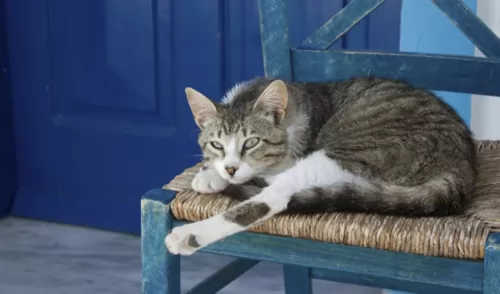 Thought to be the only native Greek variety of cat, the attractive Aegean cats hails from Greece – more specifically the Cycladic Islands of Greece.
Thought to be the only native Greek variety of cat, the attractive Aegean cats hails from Greece – more specifically the Cycladic Islands of Greece.
Formal breeding of the cat started in the 1990s but the cat isn’t recognized by any of the top cat breeding organizations. These cats are believed to be one of the oldest domesticated cat breeds, and in Greece are considered a national treasure.
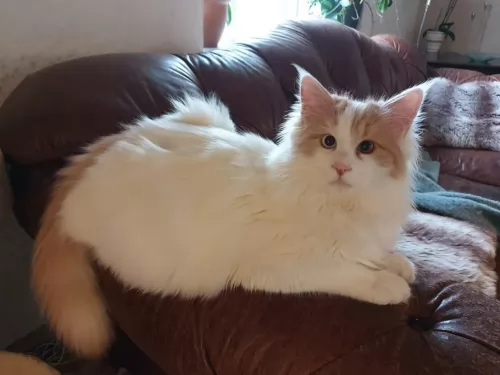 Hailing from Turkey, the Turkish Van was brought to the UK in 1955 by 2 British women, Laura Lushington and Sonia Halliday.
Hailing from Turkey, the Turkish Van was brought to the UK in 1955 by 2 British women, Laura Lushington and Sonia Halliday.
These cats were used as the foundation stock of the breed. They were brought to the United States in 1982 and accepted into championship with the Cat Fanciers’ Association in 1994.
They are a very rare breed and no other breed is allowed to be mixed into the cat's breeding schedule. All registered Turkish Van cats can have their ancestry traced back to the imported cats of Laura Lushington.
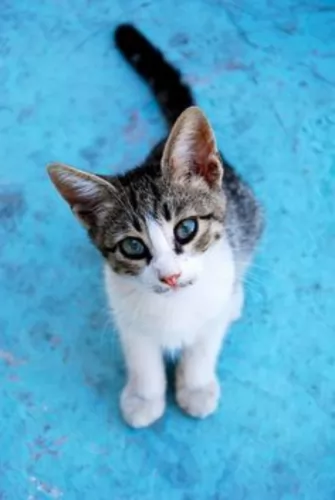 Aegean cats are a nice athletic, medium-sized cat with fairly longish hair and weighing in the region of 4.5 – 5 kg and standing in height at between 21 and 25,4cm.
Aegean cats are a nice athletic, medium-sized cat with fairly longish hair and weighing in the region of 4.5 – 5 kg and standing in height at between 21 and 25,4cm.
The cat sheds during the spring and summer, but if they are essentially indoor cats they will shed all year.
The coat can be made up of two or three colors with white always as one of the main colors and taking up more space on the coat than other colors. Other colors in all their different patterns can be grey, orange or black.
The tail of the cat is long and bushy the ears are quite large and wide at the base and are then gently rounded at the top. The head is broad, the eyes are almond-shaped and can be anything from green to blue or yellow.
These cats are strange in that they quite enjoy being around water, fascinated by the movements below the water’s surface. They’re also social cats, love being around their human family and also around children in the home.
If you have a hobby such as fishing you can take this breed of cat with. In fact, they love the outdoors and if you go out hiking or fishing, they’ll be there, climbing and exploring with you. These attractive cats are known to make awesome family pets, having been domesticated for centuries. Full of energy, they are also quite vocal.
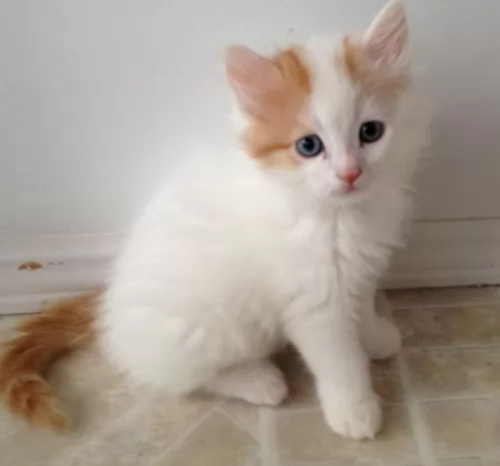 This is a medium to large-sized cat weighing roughly 3 to 8kg. It’s a semi-long-haired domestic cat breed that was actually developed in the United Kingdom with a selection of cats from Turkey.
This is a medium to large-sized cat weighing roughly 3 to 8kg. It’s a semi-long-haired domestic cat breed that was actually developed in the United Kingdom with a selection of cats from Turkey.
The breed is distinguished by the Van pattern where the color is restricted to the head and tail. So the cat is white with color on the head and the tail. The Turkish Van has no undercoat and the cat has a sleek appearance.
The cat is quite long and its back legs are slightly longer than its front legs. The paws are large and they are strong jumpers.
These cats are playful, active, and independent and they are also excellent hunters. They are affectionate and form strong bonds with their human families.
They get on well with kids as well as with other pets. Energetic and agile, they love to leap up onto high places. For a cat, they also have this fascination with water and may well follow their human into a swimming pool or lake.
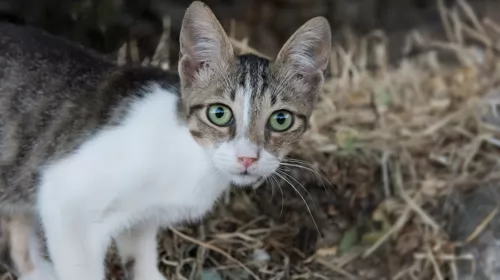 The Aegean is friendly, loving and social and he will get on well with children and animals in the home.
The Aegean is friendly, loving and social and he will get on well with children and animals in the home.
He is intelligent and will try to talk to you, even if it's to invite you to go swimming with him, as he is an unusual cat with his love of water.
Bringing such a cat into your home and heart will promise to bring you years of wonderful companionship.
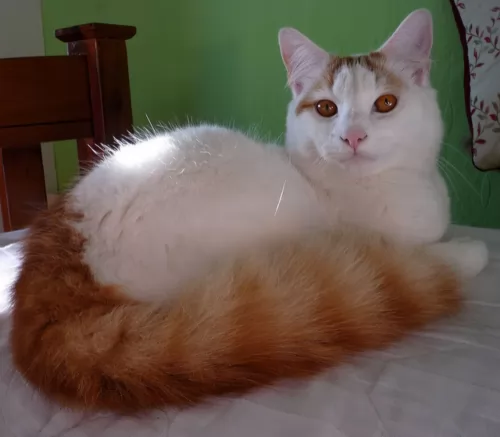 Lively, social, and intelligent, the Turkish Van is going to make you a wonderful pet and companion.
Lively, social, and intelligent, the Turkish Van is going to make you a wonderful pet and companion.
He is an active cat and will require you to play with him and provide some form of exercise for him.
He likes to leap up onto perches so getting him a climbing tree will serve him well as he is a cat that loves perching on high up places.
These cats are also low maintenance which simply adds to them being such perfect pets for single people, couples, families and seniors, just so long as he is provided with lots of love and care.
 Your Turkish Van counts on you to ensure his health and wellbeing. This will ensure he lives a long and healthy life.
Your Turkish Van counts on you to ensure his health and wellbeing. This will ensure he lives a long and healthy life.
Obesity is a major disease that contributes to many illnesses in cats. Excess weight is one of the factors for the development of arthritis and diabetes as well as some life-threatening diseases.
All kinds of parasites can invade your Turkish Van’s body. . Many types of parasites can be detected with a fecal exam, so a trip to your vet may be necessary.
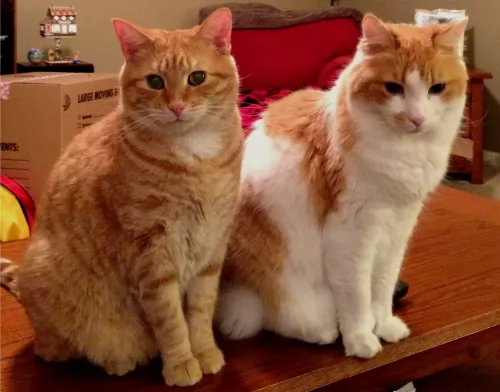 Once you bring a kitten into your home, or any pet for that matter, get to know where your closest vet is. This is so you know where to go if your pet becomes ill, he requires his first vaccines or there is a medical emergency where he needs to see someone immediately.
Once you bring a kitten into your home, or any pet for that matter, get to know where your closest vet is. This is so you know where to go if your pet becomes ill, he requires his first vaccines or there is a medical emergency where he needs to see someone immediately.
When you buy food for your cat, try and buy high-quality food. Speak to your vet if you aren’t sure how to feed your cat. Cats require taurine, which is an essential amino acid needed for healthy hearts. Always make sure your cat has fresh, cool water at all times.
Every cat, whether short- or long-haired will require some combing and brushing to get rid of those loose hairs. The Aegean cat is a moderate shedder. Not only that, if you start with this grooming when your cat is a kitten, he will look forward to it and it will strengthen the bond between you.
Both fleas and ticks can be found on cats, and controlling these kinds of parasites requires speaking to your vet for something that can get rid of them. The vet will recommend products, and a flea and tick collar can also be useful but they will need to be renewed quite frequently.
Your Aegean kitten will need vaccinations to protect him from life-threatening diseases such as Feline Leukaemia Virus, Feline Infectious Enteritis and Cat flu. The first vaccines will be required at 8 weeks of age.
Sometimes it may be necessary to also have your pet vaccinated against rabies, depending on where you live. Throughout your cat’s life, to maintain his immunity, regular booster shots will be required.
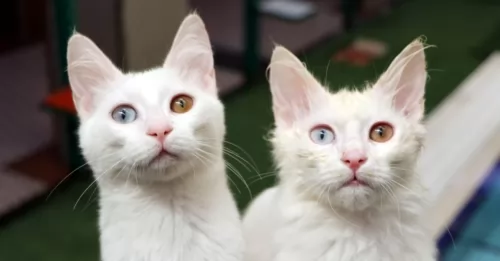 One of the most important things with a cat is diet. The cat is a carnivore. Watch his diet, and make sure he gets plenty of meaty food.
One of the most important things with a cat is diet. The cat is a carnivore. Watch his diet, and make sure he gets plenty of meaty food.
Check with your vet if you aren’t sure how to feed your cat. There must always be a constant supply of fresh, cool water available and both food and water bowls must be washed regularly.
Regularly brush your cat’s coat gently and at the same time check the body over for any unusual lumps. If you discover a new lump, get your cat to the vet.
Be sure to schedule in your cat’s vaccinations as without these your cat can die from some of the more dangerous ones.
Another wise move, if at all possible, is to sign up for pet health insurance as then you won’t dread it financially when your vet requests medical tests be done on your cat.
There are simple things you can do to ensure the longevity of your beloved cat. Good food, exercise, fresh water, and plenty of love and attention.
Turkish Vans can have problems with their teeth. Teeth brushing can be massively traumatic and uncomfortable for your pet, but the best diet and vet care will ensure healthy teeth.
Cats are meticulous about hygiene so ensure the litter box is kept clean. Remove the cat’s feces every single day.